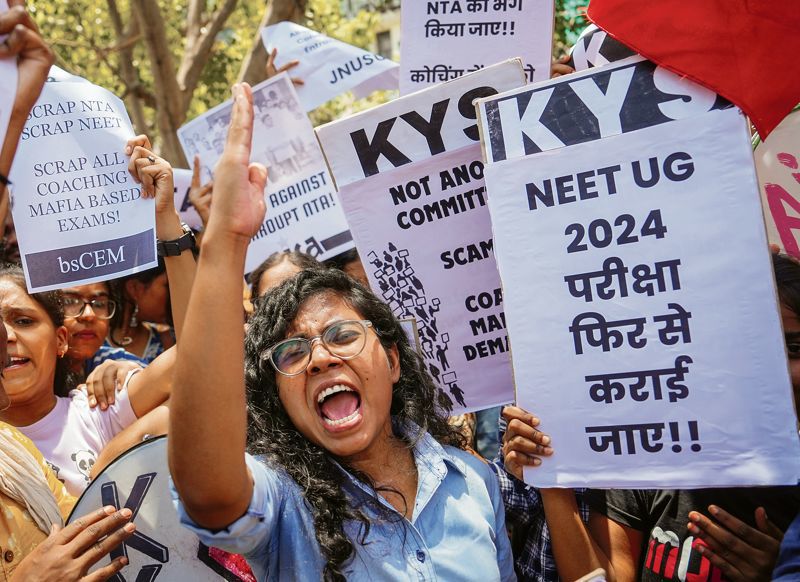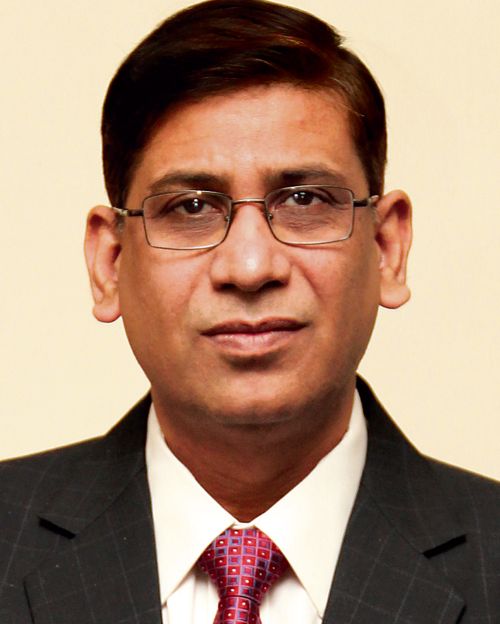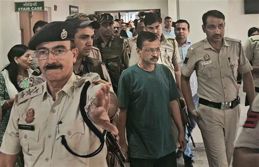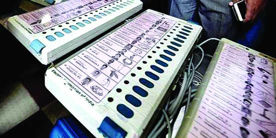
NOT SO NEAT: Questions are being raised about the integrity of NEET. PTI
Faizan Mustafa
Constitutional Law Expert
ISSUING notices to the National Testing Agency (NTA) and the Central Government on pleas seeking a fresh NEET-UG 2024 examination amid allegations of a paper leak, the Supreme Court’s vacation Bench said, “Sanctity has been affected and we need answers.” It has again been proven that NEET is not a neat way of testing students.
There are serious allegations of paper leak and the possibility of an unfair advantage given to some candidates. Questions are being raised about the integrity of the test. Technical glitches, such as poor network connectivity, were faced by many students at a number of centres, leading to disruptions in the test.
An unusually large number of candidates have obtained high scores. As many as 67 candidates scored a perfect 720, with each scoring 99.997129 percentile. The fact that six of them were at the same centre has raised eyebrows. The grant of grace marks to around 1,560 candidates for the loss of time is also being criticised, as the NTA did not disclose details of the formula based on the Supreme Court’s 2018 decision. The NTA’s clarification is that candidates were compensated through grace marks.
NEET is a unique system of admission. To pursue a medical course in India, one must clear this test. The idea of common tests was initiated by Murli Manohar Joshi when he was the HRD Minister in the then NDA government. It found some support in the judgment of the Supreme Court in TMA Pai Foundation vs State of Karnataka (2002).
NEET was notified by the Medical Council of India (MCI) in 2010. But, in 2013, a three-Judge majority decision in Christian Medical College Vellore Association vs Union of India struck down NEET. The decision was widely criticised as anti-student and one that would lower the standards of medical education. As a result, the Indian Medical Council Act, 1956, was amended and Section 10D was inserted to empower the MCI to conduct NEET. A review petition against this judgment was allowed in 2016, and the apex court ordered the conduct of NEET from 2016 itself.
Surprisingly, the Bench did not accept the Government of India’s repeated requests to permit state governments to conduct their tests at least in 2016. Interestingly, the dissenting Judge of the 2013 judgment made NEET compulsory even prior to a full hearing by the Constitution Bench. NEET was thus imposed by the court and not the Narendra Modi government. The Justice Arun Mishra-led Bench in 2020 again upheld NEET, even in respect of minority institutions. Unfortunately, the top court considered just the legality of NEET and overlooked the real impact it would have on the ground, particularly on the underprivileged and minority institutions.
Why is NEET not really student-friendly? First, if a student falls ill or doesn’t do well in the single test, he or she will not get a chance to qualify in another without losing a year. Second, it gives a student the right to select an institution of his or her choice by applying to particular institutions if multiple tests are conducted. In centralised NEET counselling, he ends up with colleges which he may not want to join.
The NEET paper leak has created problems for over 2.3 million candidates. There are translation-related errors in the question paper. NEET does not test qualities that a doctor must possess, such as compassion, empathy and passion to serve humanity. And finally, one single test is not the correct yardstick. Global best practices give weightage to marks in qualifying examinations, extracurricular activities and the statement of purpose.
But NEET is considered the best option, as our judges and the government think it promotes merit. But is there consensus on what merit really means? British sociologist Michael Dunlop Young’s book The Rise of the Meritocracy (1958) popularised what is called ‘meritocracy’. Meritocracy requires competition and equality of opportunity. Is it not a fact that the NTA and judges believe that the multidimensional construct of merit can be adequately, if not accurately, measured? When NEET and other such admission tests do not meet this fundamental criterion, competition cannot be termed as fair and just, and the equality of opportunity becomes illusionary. There are scholars in the West who argue that common admission tests cannot measure abilities that are essential for learning, such as imagination, curiosity and motivation.
There is indeed an element of class in NEET, and the Justice AK Rajan Committee did find hard evidence of such elitism. The Justice Rajan report on the impact of NEET in Tamil Nadu substantiated arguments against a single test. A majority of the 86,342 people the panel spoke to were opposed to NEET. The diversity in Tamil medical institutions has been affected with the introduction of NEET. The percentage of students from rural areas has dropped from 61.45 per cent to 50.81 per cent.
Similarly, the percentage of candidates from government schools has gone down from 1.12 per cent to 0.6 per cent. The percentage of English-medium students — already dominating medical education — went up from 85.12 per cent to 98.01 per cent. For students from economically poorer sections, it was a decline — from 47.42 per cent to 41.05 per cent. The number of first-generation learners has also dipped. If similar committees are appointed in other states, we may get similar findings. The Tamil Nadu Assembly did pass a law against NEET in 2021, but the Governor returned it in 2022. On the resubmission of the Bill, the Governor referred it to the President, who is unlikely to give her assent.
Moreover, with just one national test, commercial coaching institutes are making a lot of money. And since most of them are based in big cities, poorer students from a rural background and those who have studied in vernacular mediums remain at a disadvantage. There is also large-scale variation in the syllabus when it comes to the CBSE and state boards. If unequals are tested on the basis of one test, ie NEET, the mandate of equality is violated.
We need to redefine our notions of merit in terms of a more inclusive and plural society. Merit cannot lead to exclusion. CJI DY Chandrachud rightly held that the transformative vision of the Constitution cannot be buried by the myths around ‘merit’. Merit must be measured in terms of societal good. The policy of ‘one nation, one test’ requires a serious review and improvement.
Views are personal
Join Whatsapp Channel of The Tribune for latest updates.




























